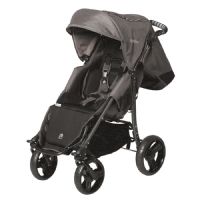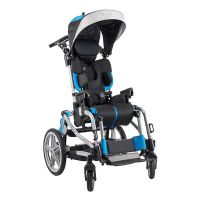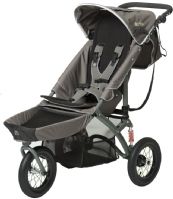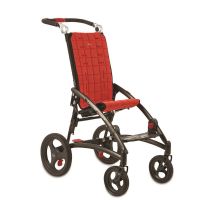 Written by Hulet Smith, OT
Written by Hulet Smith, OT
We’ll do anything for our kids. If your child has special needs, mobility issues can keep your child from fully enjoying the world around them. Being involved with family activities is important to the well-being of the child, but special needs do add to the responsibilities of caretakers. Since limited mobility can also affect cognitive, physical, and sensory development, it is especially important for kids with special needs to be able to get out into the world, and parents want to know how to best make that happen. This guide tells you everything you need to know about how to choose a special needs stroller, and it recommends our best strollers for each child's needs.
Special Needs Adaptive Strollers, Push Chairs and Pediatric Wheelchairs are all mobility aids that differ from wheelchairs and from traditional baby strollers. The terms are somewhat interchangeable, although the term pediatric wheelchair has become more common due to changes in durable medical equipment coding for reimbursement (in the past, the term wheelchair had been used for self-propelled mobility aids that could be pushed by a caregiver). These special needs strollers provide more postural support to keep the rider properly aligned and often can accommodate medical equipment like an oxygen tank or a ventilator. They have enhanced safety features and can be customized for the individual rider’s needs. These special strollers are usually lighter, compatible with a variety of terrains, easier to push, and foldable for convenient transport.
There are so many options when you’re shopping for a special needs stroller. From the extra fancy to the extra safe, from super comfy to super sporty, your child’s needs and abilities along with your lifestyle will inform your purchasing decision. After you determine what your structural and functional needs are, you can then take aesthetics and other options into account.
The four factors you must consider when shopping for a special needs stroller are:
Below we explain what each of these factors means, and we recommend our best-rated products.
Special needs strollers accommodate a wide range of physical abilities ranging from mild to complex medical needs, providing different levels of support.
For children with active lifestyles who don’t need a lot of support, these mobility aids are lighter weight. They do provide postural support and are designed to be comfortable, and often extremely portable models provide this level of support.
 | Special Tomato EIO Push Chair Stroller View Product |
More substantial models are more appropriate for children who need more medical support such as full trunk support and head and neck support. More cushions for comfort, more reclining positions, and position-holding straps are common with special needs strollers that offer moderate support.
 | Trak Pediatric Transit Folding Tilt-in-Space Wheelchair by Leggero View Product |
Tilt-in-space strollers tilt the rider back to 45° for pressure relief and offer more function and adjustability than fixed-position strollers. They provide comprehensive positioning, and are perfect for kids who benefit from tilt adjustment for pressure relief, digestion and respiratory assistance. Other benefits of these special needs strollers include improved posture, passive correction of kyphosis and scoliosis, improved sitting tolerance, and improved ability to swallow.
Positioning is an important consideration. When a significant amount of time is spent in any one position, skin issues can arise from pressure not being evenly distributed. Also, breathing and digestion issues can be impacted by positioning.
~2.webp&newwidth=365&maxheight=200) | Convaid Cruiser Transit Special Needs Stroller View Product |
Special needs strollers that are stationary offer mild support and are on a base that doesn’t move to adjust or tilt to address pressure and weight disbursement. This model is for kids who can easily reposition themselves, and is best not used for extended periods of time as there are no positioning options.
 | Special Tomato EIO Push Chair Stroller View Product |
Because it reclines and children can sleep comfortably in this position, this design is often preferred over a stroller with a stationary base. The recline feature is the most popular positioning option, and although it can be found on many models, most often it’s found on models that offer moderate support for kids who can independently reposition themselves.
 | Trak Pediatric Transit Folding Tilt-in-Space Wheelchair by Leggero View Product |
Some kids spend a lot of time in their strollers or wheelchairs because they don’t have the use of their legs. For those kids, who also might not be able to reposition themselves independently, a tilt-in-space stroller provides extreme support and relieves pressure points to decrease the risk of pressure ulcers developing. They offer the best postural support and can be positioned to facilitate the best respiration and digestion.
Some people have more than one stroller to meet all their needs, one for regular outdoor use, one for traveling, one for more rugged exploring, and maybe one for regular indoor use. There are multi-featured strollers that might have all the features you need in one model, so shop around to see if you can find one that meets all your needs.
Strollers with transit tie downs are used to secure the stroller while using public transportation or transporting the stroller in a van. These strollers are not for the child to sit in while on a bus or in a van.
 | Special Tomato Jogger All Terrain Stroller View Product |
For active families, ensuring their special needs child can join in with outdoor activities - even over rougher outdoor terrain - an all-terrain special needs stroller that’s lightweight and easy to transport fits in well with an active lifestyle.
 | Cricket Pediatric Special Needs Stroller by R82 View Product |
The weight and ease with which a stroller folds contribute to its portability. Lightweight models that fold and unfold quickly with a low profile that will easily fit into a car trunk make traveling much easier than bulkier models.
A 3-wheeled stroller is typically used for children with moderate disabilities. Highly maneuverable, this type of stroller often comes in the form of a jogging stroller, which is favored by active parents and caregivers. Four-wheeled special needs strollers have a more stable base and can accommodate children with more profound disabilities. They are also usually better outfitted to accommodate medical equipment you might have to bring along for the ride.
Smaller wheels are appropriate for indoor use, while larger wheels make it easier to maneuver over uneven ground outside. Many models have smaller front casters that aid in steering, while larger rear wheels provide stability and a smooth ride.
Since children who need special needs strollers often have hip issues, decreased upper body strength, and spastic movements and could be at risk for developing pressure sores, the seat back and height are very important. Having enough seat depth helps prevent pressure sores for those who can’t shift positions on their own, while the proper back height can provide appropriate head support.
Standard sizes for special needs strollers range from weight capacities of 75 up to 250 pounds. Appropriate sizing will affect the comfort and safety of the user.
A stroller with a single push bar allows for varied positioning of the caregiver’s hands, and it’s easier to push one-handed than a stroller with two handles.
For children who do not gain the ability to walk as they grow, a special needs stroller that adjusts to “grow” with them without having to be replaced after every growth spurt is more convenient and easier on the budget than a one-size-only model.
A swivel seat allows caregivers to switch the stroller from forward facing to rear facing mid-ride. Facing forward, the rider can enjoy looking forward to what’s ahead. In the rear-facing mode the caregiver and rider can maintain eye contact, with the caregiver better able to monitor and assist the rider.
Kids need stuff! Pockets for extra storage are often located inside the seat or seat back, under the stroller, and examples of add-ons include cup holders, equipment baskets, and storage bags.
Special needs stroller accessories include umbrellas or canopies to protect the rider from the elements, seat liners to create a more custom fit, footrests to help with correct positioning, stroller travel bags, positioning cushions and wedges, safety harness extensions, and lighting kits.
A: A child with limited mobility benefits from special needs stroller, as it enables a caregiver to propel the child more easily over uneven terrain.
A: If a doctor provides an order that puts the special needs stroller into the same durable medical equipment category as wheelchairs and walkers are covered, chances are it will be covered.
A: A medical stroller is more easily portable than a traditional wheelchair, and accommodates larger individuals than a traditional stroller can.
A: Yes, there are special needs strollers designed to accommodate larger users weighing up to 250 pounds
A: A tilt-in-space stroller provides comprehensive positioning, with tilt adjustment for pressure relief and assistance with respiration and digestion.
A: This is another term for a special needs stroller for adults who have limited or no ability to walk.
A: Conventional strollers generally fit children up to about 5 years of age and weighing not more than 75 pounds, whereas special needs strollers are built for people weighing 75-250 pounds. They also have features and available accessories to accommodate physical conditions that are affected by a lack of mobility including pressure relief, postural support, and storage for medical equipment.
To maximize their development and reach their full potential, children need chances to move, even if they cannot walk on their own. A special needs stroller can have a significant impact on your child’s quality of life, opening up the world for exploration and new experiences. Children with disabilities might have additional considerations, but like every other child, they need to move and explore so that they can enjoy optimal health.
Choosing the right special needs stroller depends on your child’s size, diagnosis, and your family’s lifestyle. Measuring correctly, and planning for growth spurts, will ensure long-term comfort of the rider. A variety of positioning options - including wedges, seat belts, head and foot rests, and tilt/recline functions - to provide the correct level of ergonomic postural support and pressure distribution for your child’s unique needs will create a healthier rider experience. And keep in mind the needs of whomever will be pushing the stroller too. From a lightweight jogger-style to a durable off-pavement model for hiking on a trail or walking on the beach, the right special needs stroller can open up new outdoor experiences for your child to enjoy with you.
A physician can prescribe a special needs stroller as durable medical equipment, and your child’s physical therapist can help you determine the style and features that will best serve your child’s needs.
For more information, visit Caregiver University and see our review of the 5 Best Special Needs Strollers.

Co-founder/CEO of Rehabmart, Pediatric Occupational Therapist, husband, and father. Passionate about connecting special needs kids with superb nutrition, sensory integration, and complementary health strategies. Excited about Rehabmart's mission to become the premier online educational platform which empowers caregivers by spotlighting innovative devices and interventions to achieve optimal patient response and recovery.